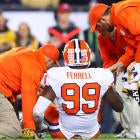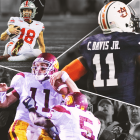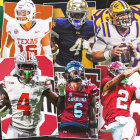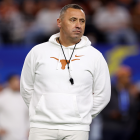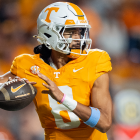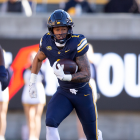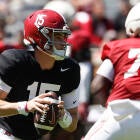Three-quarters of FBS schools surveyed are undecided or supportive of a uniform injury report in college sports, according to a study released Monday by a national athletic directors organization.
The LEAD1 Association found that 53 percent of schools responding would agree or strongly agree that "college sports should move towards a more uniform injury reporting approach." Another 23 percent said they were neutral.
Only 24 percent said they disagreed or strongly disagreed.
A majority of schools surveyed in half of the 10 Football Bowl Subdivision conferences support injury reports, according to the survey (Sun Belt, Mountain West, Conference USA, Big Ten and ACC). In the Pac-12, Big 12 and American, a majority were against. There was no plurality among the schools surveyed in the SEC and MAC.
Approximately 100 of the 130 Football Bowl Subdivision responded to LEAD1's phone survey. LEAD1 would not release the individual responses from schools.
A uniform injury report has been one of the hottest topics in college athletics since single-game sports betting became legal in May after a Supreme Court decision.
Coaches and administrators are already concerned about how sports betting in general will impact their jobs and the integrity of sports.
Traditionally, coaches are reluctant to release injury information. But it's the transparent flow of injury information in the NFL that makes the sport so attractive to bettors -- both legally and illegally.
That information is the key to Nevada's legitimacy in sports gambling. Now that sports gambling is legal nationwide, an injury report has been discussed in college athletics to address the transparency concerns.
"LEAD1's position is that we need to protect student athletes," said Bart Lambergman, a LEAD1 policy researcher. "There is vulnerability in any sports betting scandal ... but all those scandals that have have occurred in the last 25 years have been in college."
In fact, there has been at least one game-fixing scandal in college athletics in each decade since the 1940s. Only one of those has been in major-college football.
CBS Sports has reported on how college football games could be fixed and the coming implications of legal sports gambling.
The study represents the most wide-ranging college survey of the subject after sports gambling became legal nationally in May. Since that time, four states have added per-game sports gambling -- New Jersey, Delaware, Mississippi and West Virginia.
The general feeling in college sports is a uniform injury report is probably coming as early as the 2019 college football season. How that looks is the issue. CBS Sports reported in July the Big Ten had asked the NCAA to begin developing a national injury report.
That same month, what was termed an NCAA "internal working group" began looking into the new impact of sports wagering. The NCAA has not released the names of those individuals on the working group.
Football giants Oklahoma, Alabama and Ohio State did not respond to the injury report survey. Lambergman said that was not necessarily intentional, adding several of those were busy with the beginning of the football season.
Other LEAD1 survey findings on Monday:
- Sixty-two percent of schools would favor an integrity fee in response to legal sports gambling. The "fee" would ostensibly be used to beef up compliance for schools to oversee the new wagering landscape on their campus. However, wagering companies have made it clear they aren't likely to share any of their handle -- essentially the profit they make from legal gambling -- with colleges.
- Twenty percent of schools would accept sponsorship money from gambling interests.
- Half of schools are considering adding esports as a varsity sport within five years.
- Seventy-one percent of schools believe esports will be a "broadly-followed competitive undertaking" for the foreseeable future.
- What department should overlook an activity that hasn't been solidly identified as a college "sport" varies. Respondents were split between student affairs, athletics and academics overseeing esports.
Former basketball All-American and Congressman Tom McMillen is LEAD1's CEO and president.
![[object Object] Logo](https://sportshub.cbsistatic.com/i/2020/04/22/e9ceb731-8b3f-4c60-98fe-090ab66a2997/screen-shot-2020-04-22-at-11-04-56-am.png)







